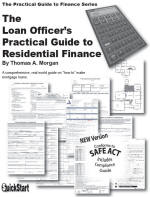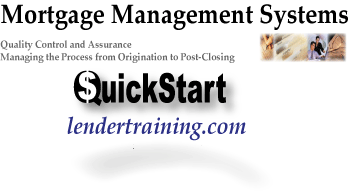|
|
|||
|
September 22, 2010 - "News You Can Use" Having trouble reading this document? Download on-line at http://quick-start.net/mortgageprofessional.htm |
|||
|
Market Failure Results in Originator Compensation Changes
The changes to Originator Compensation that The Dodd/Frank Act and the provisions of the Consumer Financial Protection Regulations have enacted will go into effect April 1, 2011. The rules are not as bad as some may think. Reading the regulation with special attention to the examples on pages 100 – 107 of the Federal Register gives clear guidance on originator compensation. |
UPDATE CENTRAL Mortgage Manuals Customers - Get Your Policy Updates Here Origination Module, Processing Module, Admin Module and Quality Control Modules Updated |
Banks and Credit Unions - Adding a mortgage division -FDIC and NCUA accepted policies and procedures.
Looking for Lending Policies and Procedures?Complete customizable templates
Loan Officer/Processor Training - Books, Manuals and on-line Training - 2010 Versions Now Available! Summer Sale Ends 10/15/2010.
Production Managers - FREE Training Site for basic introductory information
Red Flag ID Theft Program Required by 5/1/09
|
|
|
Dual Compensation
Mortgage originators may only receive compensation from either the borrower, or the lender/creditor but not both. This has been interpreted to mean that you can either be paid via yield spread (YSP), or by direct payment from the borrower. This is meant to eliminate the unscrupulous practice of receiving a fee from the borrower and an undisclosed premium from the investor/creditor. The example provided in the regulation stipulated that, if the fee is a combination of yield spread and borrower paid fees, AND IS DISCLOSED AS SUCH ON THE RESPA REQUIRED GFE, the origination charge derived from the combination is acceptable.
That said, there can be no hidden compensation, such as contests, prizes or other mechanism for additional compensation.
Compensation Not Based on Loan Terms
Compensation is not capped, but it may not vary based on loan terms other than loan amount. This means the end of overage and opportunistic pricing. It does not affect the creditor’s internal pricing. One commentator said this would end broker paid closing costs because the broker couldn’t adjust the rate to increase closing costs for smaller loans. This creates a challenge: “How do we compensate loan officers if we can’t base it on our revenue?” Several proven models seem to emerge from the debate:
Steering into Higher Commissioned Products
When a company goes away from one of these compensation models it puts itself at risk of allegations of “steering”. Steering is a recommendation of a mortgage product that results in a higher commission. This is illegal unless the originator can prove that the higher commission product offers a superior benefit to the consumer – difficult to prove and the burden is on the lender.
The “Safe Harbor” is a technical analysis – really, a side by side comparison – of the different products; showing 1.) lowest rate 2.) lowest fees, and if there are prepayment penalties, 3.) lowest rate and/or fees with or without prepayment penalties.
Market Failure
The element of this Act that bothers most people is regulation of compensation. We see it as somehow un-American. Americans relate everything to the market and believe that the market will self-regulate. The framers of the regulation seemed to anticipate this and in the preamble commented that the need for it was brought about by “market failure or imperfection which contradicted the laws of supply and demand”. |
|||
|
Train the Trainer, In-House Training Program Is it the end of contract private training companies in the mortgage industry? The advent of the Nationwide Mortgage Licensing System (NMLS), and the incumbent centralized education approval that it includes, presents a tremendous opportunity for companies with multiple employees to develop their own internal training programs for certification purposes. The legacy 50 state licensing ad-hoc system with its patchwork quilt of requirements made the education certification process difficult even for full time compliance companies. The new protocol makes it easier for smaller companies to have a state or even national certification education program. While the state licensing systems previously in place now have a uniform “overlay”, the states are still in charge of licensing. But the new system forces states to “get out of the education approval business.” The SAFE Act requires that the NMLS approve course material and certify that federally mandated minimums are included. Some states, such as Utah and Texas, have robust and heavy education requirements and are very invested in the review process. These states may maintain their own separate additional requirements. Most states, however, see that having a separate state education approval function is a duplication of effort. These states are more than happy to turn over the education certification function. This means that in the future it will be much simpler to get an instructor, a course or course material approved. In addition, unlike virtually every other piece of legislation spawned by the housing finance crisis, the cost is substantially reduced. Under the old systems, multi-state course licensing meant a training company would have to spend over $28,000 just to get a course approved nationally. In the new system the cost is $600. Generating Your Own Program – Is it Worth it? The question of internal training program feasibility is a calculation that will vary as the market determines the per person cost of the comprehensive curriculum. With as few as 3 employees, it makes sense to have an internal training program.
Unfortunately, it is never that simple. This model does not take into account the cost of developing a course, the application and approval process, and having an instructor to run the course. Of these impediments, course development is the most troubling. A course book can be 400 pages long and, particularly these days, the content is a constantly moving target and a challenge to update. Otherwise, filling out the application form is easy to do internally. As to the instructor, most companies have a manager or senior person who enjoys teaching, so that’s not a problem either. This means that, if you purchase or lease a course, you can arrange a training program for your employees at a substantial cost savings while getting all of the other benefits of an in-house training program at the same time. Does it still make sense? What is clear from this calculation is that, if you have at least 11 originators, it makes sense to at least consider an in-house course.
What are the benefits of an in-house training program? Control the Message - One of the most frequent complaints regarding outside trainers is that they do not understand how your company runs. Combining an in-house program with other vocational training can reinforce your company’s standard procedures, values and methods. In addition, regular meetings can be used as time to deliver required training topics that would be covered as a matter of the course of business. Manage the Time – The most expensive part about training origination personnel isn’t the cost of the training, it’s the time spent away from phones or sales related activity. In an in-house program, compliance training can be combined with vocational skills training. This means your origination staff spends less time in training and more time doing what you pay them to – bring in business. When and Where you Want It – Instead of having to coordinate a far clung event at an outside party’s convenience, you can provide training at a moment’s notice, at whatever location is convenient. Having a company meeting? Schedule some training as part of the event. Internal Training Programs are our specialty. Let us handle the entire process for you.
|
|||
|
QuickStart Quality Control Systems and Mortgage Training Programs 1 Research Court, Suite 450 Rockville, MD 20850 301-738-7031 - Office 877-91-TRAIN - Toll Free 877-729-4033 - Fax
|
|
||
| © 2010 QuickStart//MortgageManuals.com/Lendertraining.com | |||





